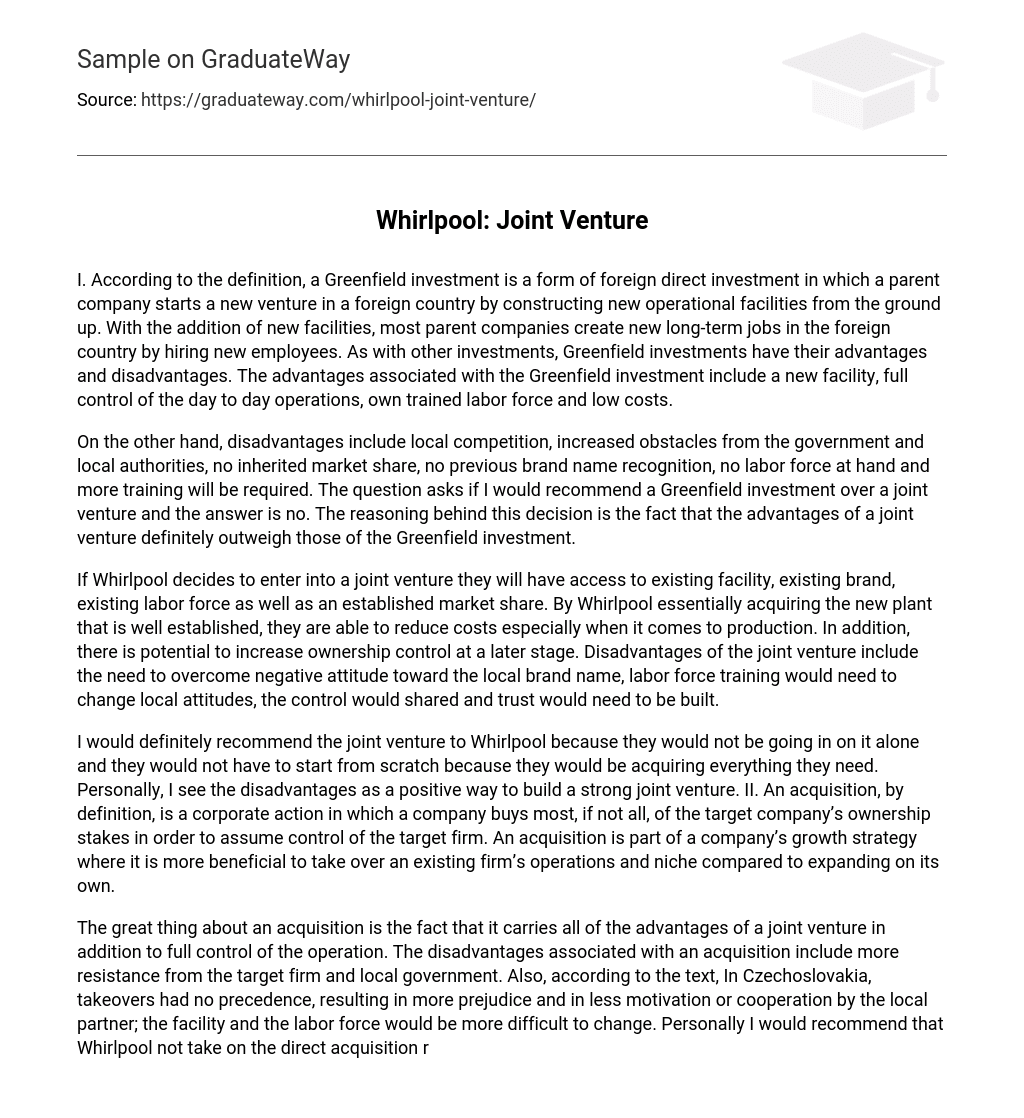I. According to the definition, a Greenfield investment is a form of foreign direct investment in which a parent company starts a new venture in a foreign country by constructing new operational facilities from the ground up. With the addition of new facilities, most parent companies create new long-term jobs in the foreign country by hiring new employees. As with other investments, Greenfield investments have their advantages and disadvantages. The advantages associated with the Greenfield investment include a new facility, full control of the day to day operations, own trained labor force and low costs.
On the other hand, disadvantages include local competition, increased obstacles from the government and local authorities, no inherited market share, no previous brand name recognition, no labor force at hand and more training will be required. The question asks if I would recommend a Greenfield investment over a joint venture and the answer is no. The reasoning behind this decision is the fact that the advantages of a joint venture definitely outweigh those of the Greenfield investment.
If Whirlpool decides to enter into a joint venture they will have access to existing facility, existing brand, existing labor force as well as an established market share. By Whirlpool essentially acquiring the new plant that is well established, they are able to reduce costs especially when it comes to production. In addition, there is potential to increase ownership control at a later stage. Disadvantages of the joint venture include the need to overcome negative attitude toward the local brand name, labor force training would need to change local attitudes, the control would shared and trust would need to be built.
I would definitely recommend the joint venture to Whirlpool because they would not be going in on it alone and they would not have to start from scratch because they would be acquiring everything they need. Personally, I see the disadvantages as a positive way to build a strong joint venture. II. An acquisition, by definition, is a corporate action in which a company buys most, if not all, of the target company’s ownership stakes in order to assume control of the target firm. An acquisition is part of a company’s growth strategy where it is more beneficial to take over an existing firm’s operations and niche compared to expanding on its own.
The great thing about an acquisition is the fact that it carries all of the advantages of a joint venture in addition to full control of the operation. The disadvantages associated with an acquisition include more resistance from the target firm and local government. Also, according to the text, In Czechoslovakia, takeovers had no precedence, resulting in more prejudice and in less motivation or cooperation by the local partner; the facility and the labor force would be more difficult to change. Personally I would recommend that Whirlpool not take on the direct acquisition rather than the joint venture.
In the case it states that during the joint venture Whirlpool later bought Tatramat and earned full control over the years. Whirlpool should have stuck with the joint venture to reach maximum efficiency and profitability. III. The risk trade off is an assumption in which future return escalates with an increase in risk. This shows that levels of uncertainty are associated with low prospective returns. Potential levels of uncertainty are a concern; they can be associated with high prospective returns. The assumption states that invested money may possibly turn into higher profits under certain circumstances.
Essentially, the money may have a possibility of being lost. Whirlpool as a corporation needs to be aware of the risk tolerance even when selecting investments for its portfolio. Whirlpool took a risk when they purchased Tatramat and relocated its headquarters, thus changing the name to Whirlpool Slovakia. Whirlpools practice of taking risk is the cost associated with the achievement of large profits. Ultimately, if a company needs to increase profits, there is no room for risk avoidance. The reason Whirlpool decided to takeover Tatramat was to develop trade-offs for Foreign Direct Investment modes





